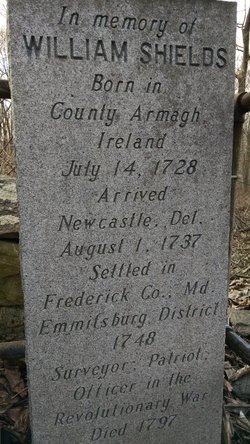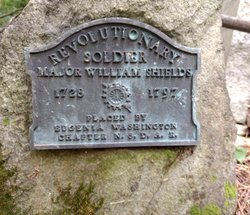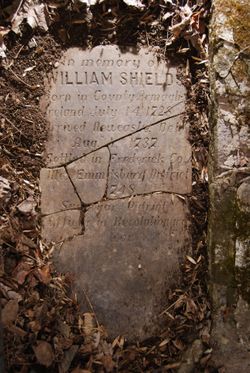William SHIELDS
SAR Patriot #:
P-330077
The following information was assembled from numerous sources and cannot be used directly as proof of Qualifying Service or Lineage.
It is considered a research aid and is intended to assist in locating sources that can be used as proof.
State of Service: MD
Qualifying Service: Captain / Patriotic Service
DAR #: A103714
Birth: 14 Jul 1728 / Armagh / Ireland
Death: bef 09 Aug 1797 Emmitsburg / Frederick / MD
Qualifying Service Description:
- Committee of Observation, Fredrick Co, MD
- 2nd Company of Emmetsburg, MD
- DAR states:
- 3RD BATT, MIDDLE DIST, FREDERICK CO MILITIA;
- ASSOCIATOR
Additional References:
- T J C Williams, Historical & Biographical Records, History of Emmetsburg, MD Vol 1, pg 90, 96
- Maryland Hist Mag: Volume 11, pg 57, 172
- History of Emmetsburg, MD, pg 18
- DAR Patriot Index, pg 612
- DAR cites MD HIST MAG, VOL 11, 1916, pg 50, 55, 163, 172
Spouse: Jane Bently Williams;
Children: Ebenezer; Henry; Samuel; William; John; James; Agnes; David;
Members Who Share This Ancestor
| Date Approved | Society | ACN | SAR Member Info | Lineage via Child | View Application Detail | |
|---|---|---|---|---|---|---|
| 1958-01-16 | PA | Unassigned | Theodore Lewis Lenker (82848) | Ebenezer | ||
| 1962-01-18 | DC | Unassigned | Marion Benson O'Kelley Jr (88133) | William | ||
| 1962-02-20 | DC | Unassigned | John David O'Kelley (88145) | William | ||
| 1962-04-30 | TX | Unassigned | Edwin Davis Guinn (88334) | |||
| 1964-10-14 | IA | Unassigned | Benson Hyrcanus Guinn (91306) | Henry | ||
| 1965-11-09 | PA | Unassigned | John L Lenker Jr (93531) | Ebenezer | ||
| 1969-02-11 | PA | Unassigned | William D Lenker II (98186) | Ebenezer | ||
| 1969-04-17 | TX | Unassigned | David C Guinn (98391) | Henry | ||
| 1971-07-30 | IN | Unassigned | Robert Colonel Shields (101023) | John | ||
| 1977-01-13 | IA | Unassigned | Martin Lee Skubinna (112477) | Henry | ||
| 1987-09-21 | MN | 224664 | Robert Paul Schmidt (129940) | Henry | ||
| 1987-09-21 | NC | 224665 | William Allen Schmidt (129941) | Henry | ||
| 1995-08-22 | AZ | 210320 | John Duffus Weiss (141004) | Henry | ||
| 2008-12-19 | PA | 33789 | David Franklin Lenker (173118) | Ebenezer | ||
| 2013-11-02 | NY | 55647 | Leif Ford Oxaal (189010) | Henry | ||
| 2018-04-06 | OH | 80457 | Matthew Thomas Wendling (207107) | William |
Location:
Emmitsburg / Frederick / MD / USA
Find A Grave Cemetery #:
Marker Type:
DAR marker
SAR Grave Dedication Date:
Comments:
- There appear to be three stones:
- A badly damaged/broken headstone that appears to be contremporary with the death of the Patriot
- An upright granit memorial stone that appears to be 20th century in origin
- A bronze plaque on a field stone erected by the DAR
Directions to Cemetery / Gravesite:


